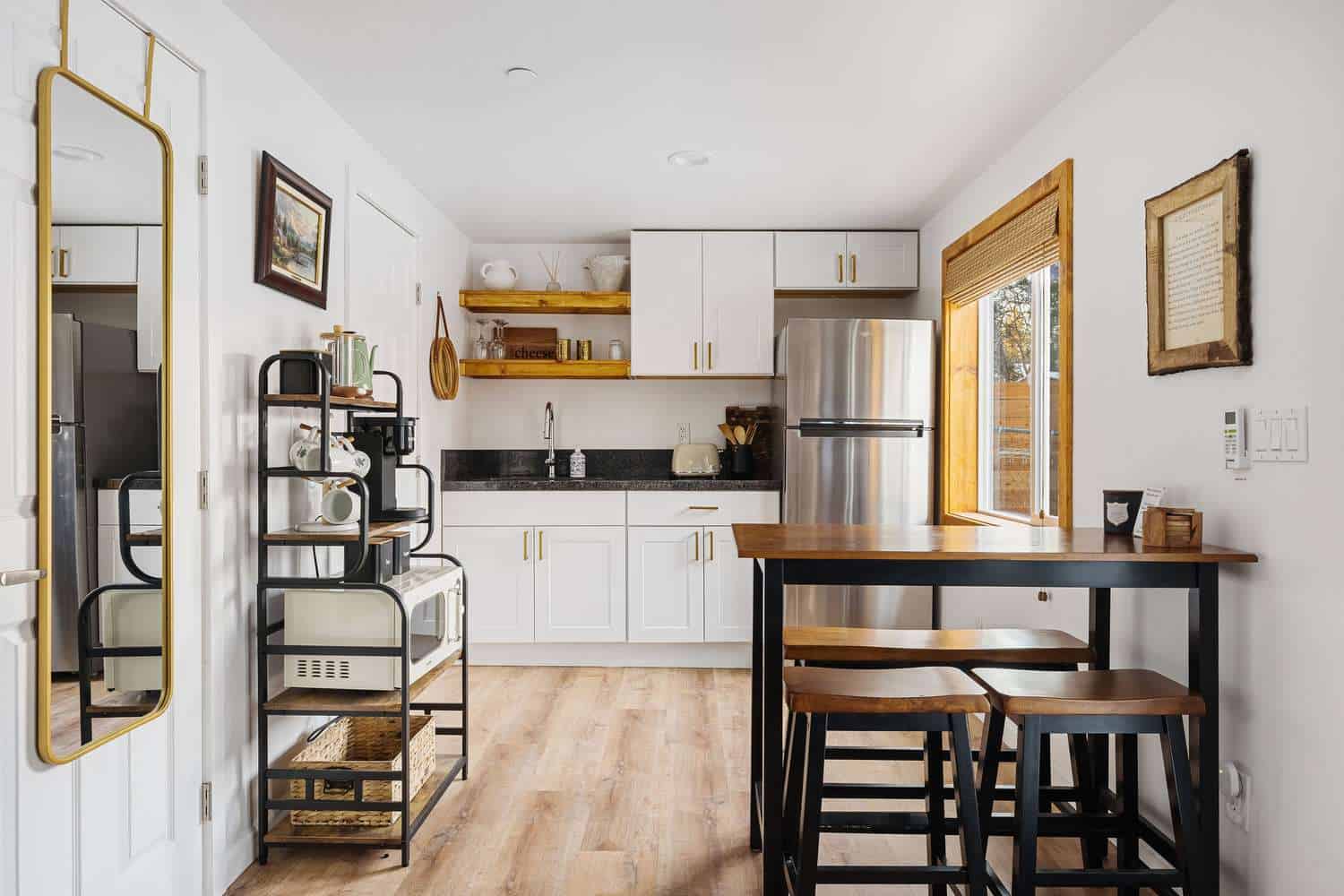Creating a stylish and functional kitchen is essential when working with limited space. Despite the challenges of small kitchen areas, effective design strategies and space-saving tips can help maximize these compact spaces’ potential. This article explores various ideas and techniques to transform compact kitchens into efficient and visually appealing culinary havens.

Tip #1: Optimize Storage Space
Efficient storage solutions are crucial for compact kitchens. Maximize storage space by utilizing every nook and cranny effectively. Install wall-mounted shelves or cabinets and use the area above the cabinets for storage. Incorporate stackable containers, hanging hooks, and magnetic racks to organize kitchenware and ensure easy accessibility.
Tip #2: Choose Multifunctional Furniture
In kitchens with limited space, every piece of furniture should serve multiple functions. Look for furniture with built-in storage, seating, or extra counter space. For instance, consider a folding dining table and stow it away when not in use or a kitchen island equipped with storage cupboards. By selecting multifunctional furniture, you can optimize your kitchen layout and create a more versatile workspace.
Tip #3: Create Airiness and Light
Make your kitchen appear bigger and more open with light colors and reflective surfaces. Opt for a color palette that includes mild tones for walls, cabinets, and counters. Whites, pastels, and neutrals create a sense of transparency and spaciousness. Incorporate reflective surfaces such as glass backsplashes or mirrored cabinet doors to enhance the illusion of space and add a touch of elegance to your kitchen. Consider using sleek and understated BA-AHA recessed panel doors designed to receive tile for a visually appealing finish.
Tip #4: Maximize Natural Light
Improve the ambiance in your kitchen with sufficient natural light. Keep windows clutter-free and use sheer window coverings, like frosted or transparent window films, that allow maximum light penetration. Utilizing natural light creates an open and inviting atmosphere in your kitchen.
Tip #5: Utilize Vertical Space
When horizontal space is limited, vertical space becomes a valuable resource for storage in kitchens. Attach shelves to the walls, use hanging racks to display kitchen tools and equipment, or store frequently used items. Installing hooks or magnetic strips within cabinet doors allows for hanging utensils or smaller pots and pans. Utilizing often-overlooked vertical space frees up valuable counter space and ensures optimal organization in your kitchen.
Tip #6: Incorporate Clever Lighting Solutions
Adequate lighting is essential for kitchens to create the illusion of more space and enhance the overall experience. Ensure that every corner of your kitchen is well-illuminated using various types of lighting, including ambient, task, and accent lighting. Consider placing lights below cabinets to brighten work surfaces and provide additional illumination. Chandeliers, pendant lights, or strategically placed light sources can add flair and become focal points in your kitchen. By strategically layering different light sources, you can create an inviting atmosphere for your visitors and guests.
Tip #7: Streamline Your Appliances
In compact kitchens, consider downsizing to smaller, more efficient machines that meet your operational needs. Opt for slimline dishwashers or compact refrigerators to save precious space. Integrating appliances into your cabinetry creates a seamless and streamlined look, freeing up counter space and reducing clutter in your kitchen.
Tip #8: Create Illusions of Space
In addition to using light colors and reflective surfaces, there are other effective techniques to create the illusion of space in your small kitchen. Mirrors, for example, can make a room appear larger than its actual size. Consider installing mirrors on walls or utilizing them as backsplashes to reflect light and provide a sense of depth. Open shelving can also contribute to the perception of more space while allowing you to showcase your culinary tools or decorative items effectively.
Tip #9: Embrace Minimalism
Embracing a minimalist approach is key to maintaining a clutter-free and visually appealing commercial kitchen. Avoid overcrowding counters with unnecessary equipment or decorative objects. Instead, focus on carefully selecting functional elements that add style and efficiency. Adopting a minimalist aesthetic allows you to create an atmosphere of spaciousness while maintaining a streamlined and sophisticated design.
Tip #10: Utilize Open Shelving
Open shelving is an excellent solution for small kitchens as it provides storage and creates a sense of openness. Replace some upper cabinets with open shelves to visually expand the space and showcase essential items, such as ingredients, glassware, or cookbooks, adding a personal touch to your commercial kitchen. Remember to maintain tidy and clutter-free shelves to preserve an uncluttered and professional appearance.
Tip #11: Utilize Wall Space for Hanging Storage
Turning to walls for additional storage options is wise when kitchen floor and counter space are limited. Install a wall grid system to hang kitchen essentials. Hang small baskets or hooks on the wall to store spices, towels, or oven mitts. Get creative and turn your kitchen walls into functional and decorative elements.
Tip #12: Consider a Galley Kitchen Layout
A galley kitchen layout can be efficient and stylish for kitchens with limited space. This layout gives you two work surfaces and storage. Opt for streamlined cabinets and appliances to maintain a sleek and uncluttered look. A galley kitchen layout facilitates a smooth workflow and easy access to all essential areas, making it a practical choice for small kitchens.
Tip #13: Install a Kitchen Cart or Trolley
A kitchen cart or trolley is a versatile piece of furniture useful in compact kitchens. It provides additional counter space and storage shelves, often with wheels for easy mobility. When hosting guests, use it as a cooking prep area or a serving station. The flexibility of a kitchen cart allows you to roll it away or park it against a wall when not in use. Find a cart or trolley that matches your kitchen’s design ethos and color scheme, ensuring a cohesive look throughout the space.
Tip #14: Create an Illusion of Continuity with Flooring
Use the same flooring material throughout your kitchen and adjacent spaces to maintain a seamless, uninterrupted look. Extending the same flooring into the kitchen visually expands the area and eliminates visual boundaries. Choose a durable and low-maintenance flooring option that suits your style, such as hardwood, laminate, or tile. This cohesive flooring approach enhances the sense of flow and makes your small kitchen feel more spacious.
Tip #15: Incorporate Foldable or Sliding Elements
Innovative design solutions like foldable or sliding elements can be incredibly beneficial for small kitchens. For instance, install a foldable dining table that closes when not used. Foldable or sliding doors for pantries or cabinets are also practical options, as they don’t require extra space for swinging doors. These space-saving features allow you to adapt your kitchen layout according to your needs, maximizing functionality and efficiency.
Tip #16: Add a Mirrored Backsplash
Mirrors are not only for walls; they can also serve as a backsplash in small kitchens. A mirror backsplash reflects light and creates a sense of depth and space, making the kitchen appear bigger. It adds a touch of refined sophistication and becomes a prominent feature in the area. Additionally, you can easily clean a mirrored backsplash, making it a practical choice.
Tip #17: Make Use of Window Sills
In small kitchens, window sills have untapped potential. Enhance their functionality by adding shallow shelves or installing small hooks underneath for potted herbs, small plants, or decorative items, adding charm and greenery to your kitchen. It’s a simple yet effective way to utilize often-unused areas and enhance the visual appeal of your kitchen.
Tip #18: Utilize Overhead Space
Utilizing overhead space is crucial for creating a well-organized and efficient kitchen. Use hooks or a rack fixed to the ceiling to store pots, pans, and other cooking items. Add a small shelf above your cabinets to keep things you don’t use as much. Use vertical space wisely to clear your counters and ensure a tidy and functional workspace.
Tip #19: Keep the Clutter at Bay
In small kitchens, clutter can quickly diminish efficiency and aesthetics. Minimize countertop appliances and decorative items to maintain a clean and open look. Invest in drawer dividers, cabinet organizers, and storage containers to provide designated spaces for every item. You can significantly enhance your kitchen’s practicality and visual appeal by prioritizing order and cleanliness.
Tip #20: Personalize with Stylish Accessories
Lastly, infuse your personal touch into your small kitchen through stylish accessories. Choose unique and eye-catching kitchen tools, colorful dishware, or vibrant textiles to add personality and flair to the space. Hang artwork or create a small gallery wall to create a focal point. These personalized touches can make your commercial kitchen feel inviting and reflect your style, enhancing the overall dining experience.
Conclusion
In conclusion, transform your kitchen into a stylish and efficient space with the right design strategies and space-saving tips. General contractors, commercial kitchen managers, and restaurant and hotel owners can maximize the potential of these tight areas by optimizing storage space, incorporating clever lighting solutions, utilizing vertical space, and embracing a minimalist approach. You can create aesthetically pleasing kitchens by implementing these ideas and using sleek and functional design elements, such as BA-AHA recessed panel doors. With attention to detail and a focus on efficiency, your compact kitchen can become a standout feature in your establishment, providing an excellent culinary experience for your guests.

